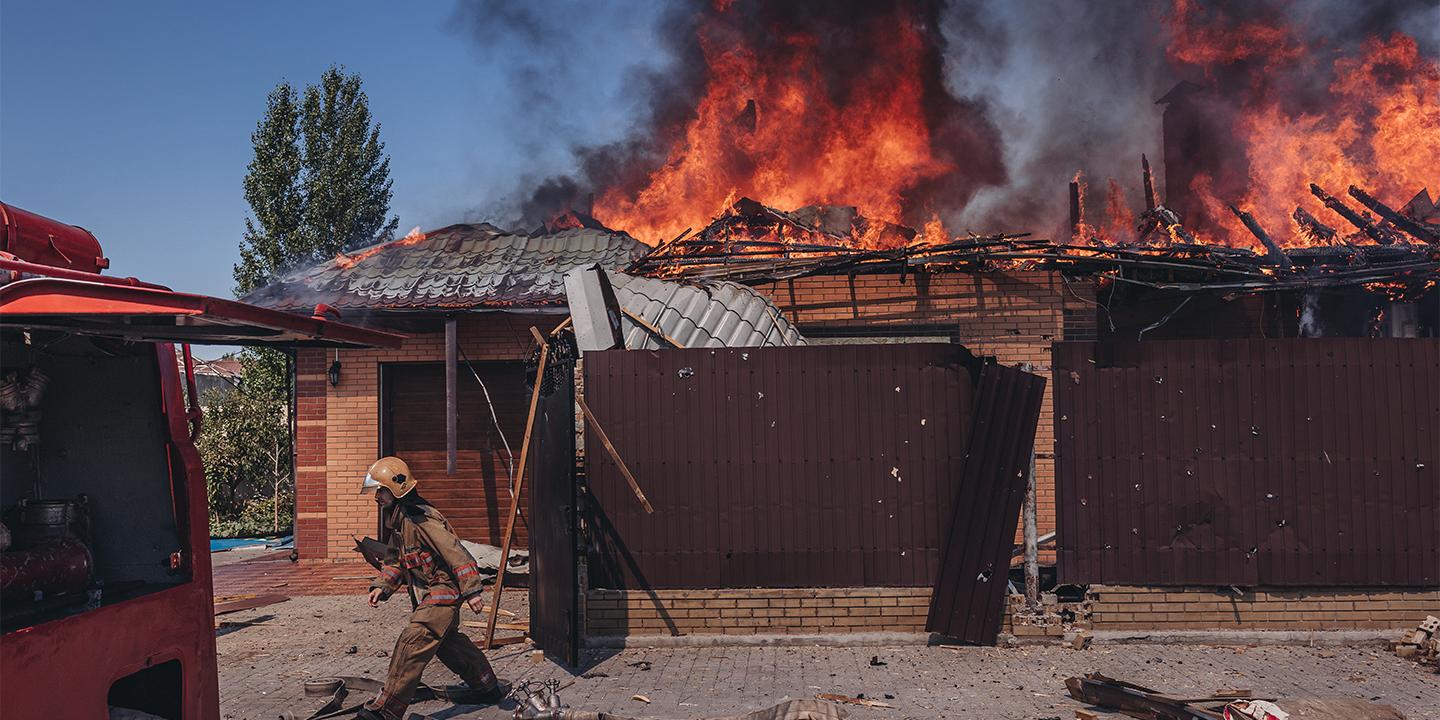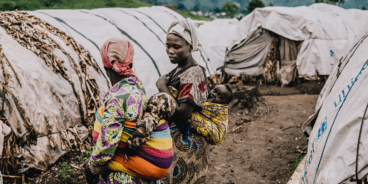

Atrocity Alert No. 311: Ukraine, Central African Republic and China
Atrocity Alert is a weekly publication by the Global Centre for the Responsibility to Protect highlighting situations where populations are at risk of, or are enduring, mass atrocity crimes.
UKRAINE ORDERS THE EVACUATION OF OVER 200,000 CIVILIANS REMAINING IN DONETSK
On 30 July Ukrainian President Volodymyr Zelensky ordered the mandatory evacuation of hundreds of thousands of civilians living in Ukraine-controlled territory in the eastern region of Donetsk. Up to 220,000 civilians, including approximately 50,000 children, are estimated to be in Donetsk, where months of Russian shelling – as part of its campaign to control the region – has begun to destroy the infrastructure to deliver heat and electricity. President Zelensky warned that “the more people leave Donetsk region now, the fewer people the Russian army will have time to kill.” As of 31 July the UN Human Rights Monitoring Mission in Ukraine (HRMMU) had verified over 12,000 civilian casualties in Ukraine since the 24 February invasion. This figure includes the deaths of at least 5,327 people, including 352 children. Half of the civilian casualties documented by the HRMMU were recorded in the eastern regions of Donetsk and Luhansk.
The unprecedented mass evacuation directive was issued as Russian strikes continue across Ukraine, causing daily civilian casualties. Cities in the southern region of Ukraine have been hit particularly hard in recent days as Russia attempts to capture more territory while reinforcing its defensive positions. In Nikopol, at least 40 Russian GRAD rockets hit residential areas on 31 July alone. Following an apparent Russian cluster bomb attack on 29 July that killed at least seven civilians at a bus stop in Mykolaiv, the city withstood its fiercest bombardment yet on 31 July when 12 missiles hit scores of homes and two schools.
Ukrainian and Russian authorities have traded blame over the 29 July explosion at the Olenivka prison in the Russian-backed separatist-controlled part of Donetsk region, which killed at least 53 Ukrainian prisoners of war. The International Committee for the Red Cross has requested access to the prison to conduct an investigation and emphasized in a statement that “all prisoners of war, wherever they are held, are protected under international humanitarian law. They are no longer part of the fight and should not be attacked.”
Meanwhile, as part of the grain export deal brokered by Türkiye and the UN, the first shipment of Ukrainian grain since Russia’s invasion left Odesa on 1 August. The grain export deal – signed separately by Russia and Ukraine on 22 July – aims to restore the flow of grain from Ukraine, as well as fertilizer and grain from Russia to help ease shortages around the world.
As the war in Ukraine enters its sixth month, civilians continue to bear the brunt of the conflict. All parties must honor the grain deal to ensure the export of grain, fertilizers and other food products. The international community must continue to work toward a comprehensive ceasefire agreed by all parties to the conflict, as well as support Ukraine in upholding its responsibility to protect its civilians.
EVIDENCE OF ATROCITY CRIMES IN THE CENTRAL AFRICAN REPUBLIC
On 25 July the Office of the UN High Commissioner for Human Rights (OHCHR) released two reports detailing likely war crimes and crimes against humanity in the Central African Republic (CAR). The reports examined atrocities perpetrated since December 2020, when an alliance of armed groups – including the Front Populaire pour la Renaissance de la Centrafrique (FPRC) and Unité pour la paix en Centrafrique (UPC) – launched an offensive to overthrow the government. The Central African Armed Forces (FACA) – working closely with Russian-linked forces – responded with counter-offensives. Since then, the UN has documented a dramatic increase in serious human rights violations and abuses, particularly targeted attacks against minority communities and conflict-related sexual violence.
FACA troops and allied forces have reportedly recruited, trained and armed former combatants of the predominantly Christian anti-Balaka militias, as well as dozens of young Christians, to use as auxiliaries in their offensives against the UPC in Ouaka prefecture. The first report highlighted how one of these militias carried out a “well-coordinated” and “premeditated” attack against the village of Boyo between 6-13 December 2021. The armed fighters killed 20 civilians and looted more than 540 homes. An estimated 700 civilians were held for three days in the village mosque as the attackers threatened to detonate grenades. OHCHR determined that the militia had the “intention” of punishing the Muslim community in Boyo, who they perceived to be supporters of the UPC. The acts perpetrated in Boyo may constitute war crimes and crimes against humanity.
According to the second report, members of the FPRC and UPC committed widespread and systematic conflict-related sexual violence, including rape, gang-rape and sexual slavery, in Mbomou and Haute-Kotto prefectures between December 2020 to March 2022. At least 245 women and girls were victims of recurrent sexual violence during this period. UN High Commissioner for Human Rights, Michelle Bachelet, said, “this unprecedented level of sexual violence in CAR is shocking and heart-breaking. The brutal stories we heard from victims of sexual slavery and sexual violence depict crimes that should never have happened… These atrocities are utterly unacceptable and must be brought to an end immediately.” The UN peacekeeping operation in CAR (MINUSCA) continues to document cases of sexual violence in areas under the control of the FPRC and UPC, indicating that this pattern of sexual violence is ongoing.
It is imperative that FACA and its allied forces ensure the protection of all populations during military operations and stop using militias to carry out attacks against civilians. CAR authorities must guarantee that MINUSCA can effectively carry out its mandate, including its human rights investigations. Armed groups must cease their attacks and reprisals against civilian populations. All individuals directly or indirectly involved in atrocity crimes in CAR should be held legally accountable, regardless of their rank, affiliation or nationality.
XUAR PARAMILITARY CORPORATE GROUP CLOSELY TIED TO UYGHUR GENOCIDE
The Xinjiang Production and Construction Corps (XPCC), also known as the Bingtuan, is more deeply involved in the regional government’s repressive and genocidal policies toward Uyghurs and other ethnic groups in China than previously thought, according to a new report from the Helena Kennedy Centre for International Justice. The XPCC was established in the 1950’s and is considered by the Chinese government as a “special system of integration of government, military and enterprise.” According to the report, the XPCC was dispatched by top levels of the Chinese government to act as powerful paramilitary corporate conglomerate to suppress the Uyghur population. The group is responsible for myriad abuses targeting Uyghurs in the Xinjiang Uyghur Autonomous Region (XUAR), including systematic forced migration, forced labor, mass internment, land expropriation, repressive policing and religious persecution. These abuses could constitute crimes against humanity.
One of the primary repressive strategies utilized by the group is land expropriation, often involving the destruction of existing structures. XPCC authorities pressure Uyghur landowners to transfer their land ownership to non-Uyghurs, and then coerce them to work in factories or other industries. In one village, 70 percent of the land was transferred from Uyghur farmers and at least 200 people were moved to other sectors. This process contributes to the destruction of Uyghur culture, traditions and ways of life. The XPCC has also been directed by the Chinese government to increase XUAR’s population of Han Chinese people – the country’s majority ethnic group – as a way to dilute the proportion of Uyghurs in the region. Since 2016 the group has increasingly served an integral role in forced labor programs, including labor transfers to factories across XUAR and other regions of China.
The group controls a quarter of XUAR’s arable land and has corporate holdings that may be linked to over 850,000 entities around the world, including a majority stake in at least 2,800 companies. Although XPCC’s supply chains are difficult to trace, there is evidence that its products reach global markets. According to the report, some of the XPCC’s most important products and services, including tomatoes, cotton, chemicals and construction, can be traced through global supply chains and investments.
Liam Scott, Research Associate at the Global Centre for the Responsibility to Protect, said, “following the grave revelations uncovered in this report, member states must do more to uphold their responsibility to protect Uyghurs and other majority-Muslim ethnic groups in XUAR. To begin with, member states should sanction the XPCC and its subsidiaries and prevent the import of goods that may be tied to forced labor in XUAR.”
Related Content


